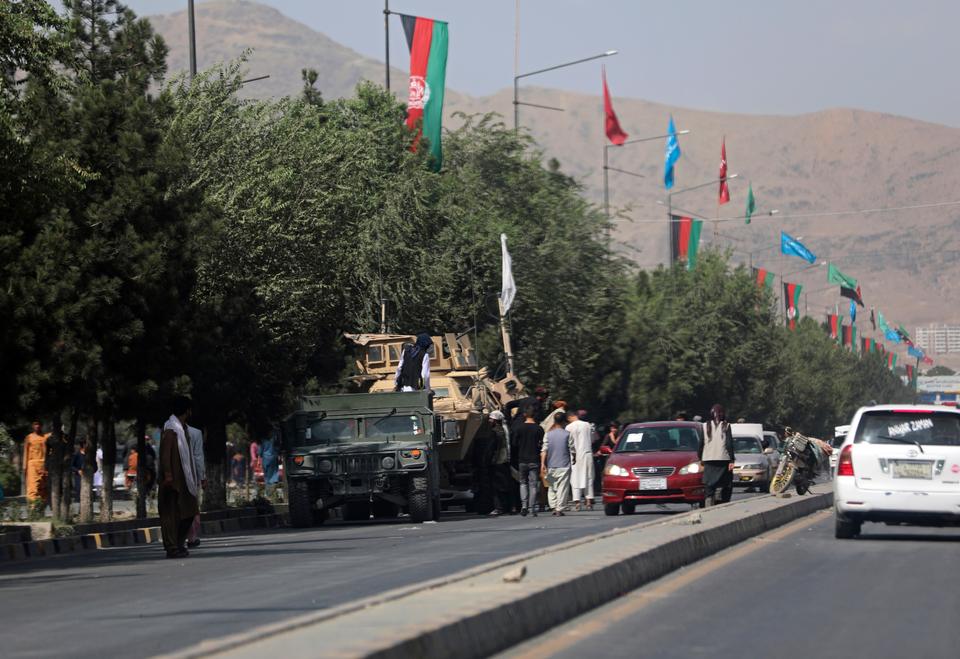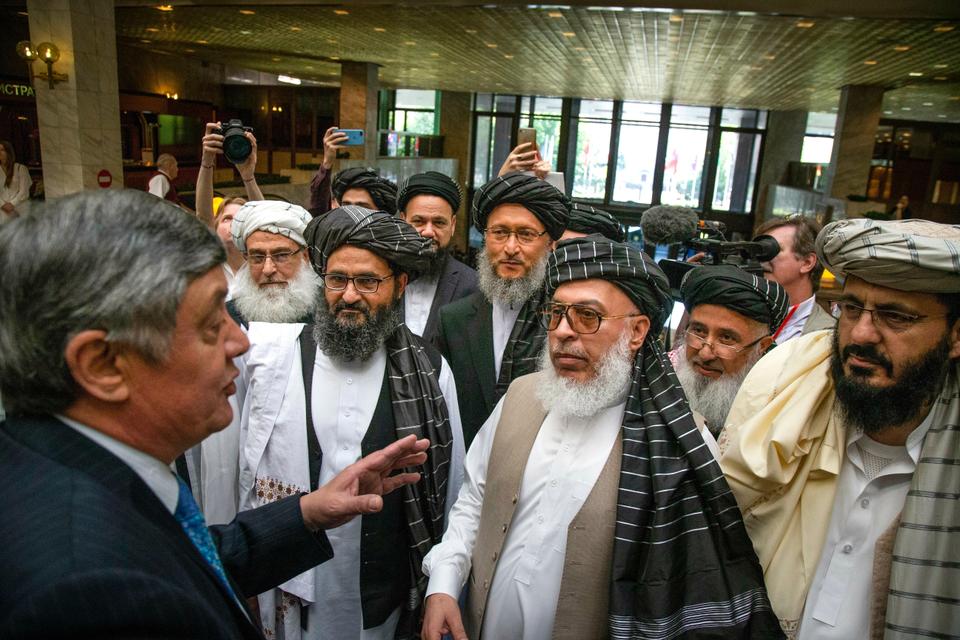The current regional balance of power, in which Russia and China see the Taliban as the lesser of two evils, and a hasty US withdrawal helped the group march across Afghanistan, experts say.
“The Taliban have won the war,” said the fleeing Afghan President Ashraf Ghani, who reportedly fled to either Tajikistan or Uzbekistan.
No one, including the US government, expected such a swift fall of the Afghan security forces as Kabul surrendered to the Taliban without a fight in a matter of 24 hours after the group landed on the outskirts of the capital over the weekend.
Despite the Taliban insurgency’s strength and its powerful local connections across the country, many experts think that some regional players and international actors, primarily the US, have played a crucial role in facilitating Taliban rule across Afghanistan.
“The Taliban made its claim to rule over Afghanistan and it was accepted [by prominent regional and international actors]. By deciding to withdraw its military from Afghanistan completely, Washington appeared to give a political sign that the Taliban will take over the country,” says Bulent Aras, professor of international relations at Qatar University.
“The extent to which the US is apathetic towards the Taliban resurgence in Afghanistan is quite surprising,” says Majid Ansari, the President of Qatar International Academy for Security Studies.
While some expected that the Biden administration might have taken a different approach toward Afghanistan from the previous Trump government’s hasty withdrawal policy, the current US president just followed suit, according to Ansari.
“It’s very likely that the US has reached a conclusion that the only way for Afghanistan to stop being a waste of resources for the US is for it to withdraw and accept whatever comes from this withdrawal,” Ansari tells TRT World.
Matthew Bryza, a former American diplomat to Azerbaijan and an expert on Central Asian politics, sees a direct connection between the US withdrawal and the Taliban’s rising power in Afghanistan. “That has nothing to do with any outside power other than the US in terms of the US giving up and withdrawing its troops,” Bryza tells TRT World.
“It was always clear to me that if together with tens of thousands of US troops on the ground and air cover provided by the US and its allies, the Afghan national army could do a little better than to fight the Taliban to a stalemate. Of course if you take away the US and other Western military support for the Afghan national army, there is no way it can win. Of course the Taliban will take over again,” Bryza says.

Bryza’s analysis suggests that without US and Western support, the former Afghan government couldn’t stand against the Taliban. It also means that despite receiving much support from the Western alliance, the Ashraf Ghani government lacked the ability to inspire resistance from some elements of Afghan society.
‘US culpable for Taliban takeover’
Under the guidance of Zalmay Khalilzad, an Afghan-American top mediator and US envoy to Afghanistan, who led Washington’s recent talks with the Taliban, the Americans are “culpable to surrender” Afghanistan to the Taliban despite the group “feigning peace”, says Kamal Alam, a non-resident senior fellow at the Atlantic Council.
While the Taliban say “they are reformed” it remains to be seen whether they truly have changed or not, according to Alam. “Biden has said it’s not his problem, so the US for the second time in 40 years has abandoned Afghanistan,” the analyst tells TRT World.
Despite Alam’s emphasis on the US role in Kabul’s fall to the Taliban, he still thinks that some international and regional actors have also played a crucial role for the group’s coming to power across Afghanistan.
“Iran, Russia, China and Pakistan of course along with the US in the guise of Khalilzad have laid the groundwork. And of course Qatar. Although Doha was not a decision maker, just a facilitator and ATM for the process,” says Alam, referring to the country’s mediating role between the US and the Taliban in recent talks.
With the withdrawal, Washington “left the Afghan problem into a big international block comprising countries like Russia and China, which have been part of the Afghan peace process, neighbouring countries [like Pakistan] and also Turkey and Qatar,” Aras tells TRT World.
In a way, with the withdrawal Washington implicitly told all these forces that from now on Afghanistan is your problem as much as mine if you like, the professor added.
Russia-China axis
For both Moscow and Beijing, the biggest concern across Central Asia, the former backyard of the Russian Empire, most of which was also part of the communist Soviet Union, as well as China’s Muslim-populated areas, is not the Taliban but Daesh and Al Qaeda, Aras says.

“They [Russia and China] don’t want Daesh and Al Qaeda to exert its influence across both Russian and Chinese parts of Central Asia. Afghan stability carries prominence over all other concerns. As long as the Taliban continues to stand against those groups, Russia and China will not go against its rule,” Aras views.
Alam echoes a similar view. “Both were historical enemies of the Taliban or these kinds of fundamentalist groups. However with bigger looming threats such as ISIS, AQ and Chinese Uighurs, Taliban became the least worse option [for both Russia and China].”
Their first priority is “security”, Alam adds. Because the Afghan government failed to control their own areas, Russia and China look for a dominant group like the Taliban to secure control of the whole Afghanistan to limit the reach of groups like Daesh. The Taliban's security control over Afghanistan makes them “acceptable” to both Russia and China, Alam says.
Ansari also believes that both Russia and China see the Taliban as a bulwark against Daesh and Al Qaeda.
“We have clearly seen that the Taliban is the only group able to combat the presence of ISIS in the country. Therefore, they present the lesser of two evils for the Russian political agenda,” Ansari observes.
For China, there is a possibility of an economic opening with the Taliban rule. “It’s clear that there is an economic stake having a stable connection to any ruling power in Afghanistan,” Ansari says.
“Therefore, they need to maintain contact with whatever party on the ground will maintain the country and be able to economically tend this partnership with China,” Ansari adds.

But Bryza, the American diplomat, does not think that the Russians and Chinese are playing any role right now on the Taliban’s rise to power.
Due to the Taliban’s roots in the former US-backed Afghan mujahideen movement, which had fought a bloody war with the former Soviet Union, “Russia is deeply worried about the Taliban and has always been,” according to the former top US diplomat. “The Chinese are also very worried [about the Taliban],” Bryza adds.
“I don’t see any great power development here other than Western powers deciding to leave Afghanistan,” Bryza views.
Meanwhile, China has said that it is ready to deepen "friendly and cooperative" relations with the government of Afghanistan, shortly after the Taliban seized control of the country.
Regional powers
Iran and Pakistan, two neighbouring countries to Afghanistan have also played a role in the Taliban’s comeback.
Pakistan has played “a historical role from refugee camps to religious scholars and logistics” in the empowerment of the Taliban across Afghanistan, according to Alam.
Pakistan and Afghanistan have some serious commonalities. Despite its dominant religious ideology, the Taliban has received support from the country’s majority ethnic group, the Pashtuns, which are also the second biggest ethnic group in Pakistan.
“However, at the same time other countries also stepped up in support such as Iran and Russia. But Pakistan remained the key one,” adds Alam, referring to the Taliban’s foreign enablers.
“There are a number of factions within the Pakistani leadership that are most sympathetic towards the Taliban cause, believing that the Taliban can establish and maintain the rule of law in Afghanistan even if the political system might be turning to be more radical and less liberal,” says Ansari.
But there are some tensions especially in the Pakistani intelligence community in regard to the Taliban’s coming to power “so strongly and so quickly” Ansari notes. As a result, there is not enough time to prepare for the Pakistani political agenda and network to comply with the events taking place in Afghanistan to keep its relations with the Taliban in a consistent and stable manner, according to Ansari.
He also draws attention to one of Islamabad’s serious concerns that Pakistan might endure a wave of refugees from Afghanistan.
Iran, a Shia majority country, which had serious tensions with the first Taliban rule in the 1990s, has also shown no significant opposition to the Taliban’s takeover of Afghanistan this time around.
“Iran has no plans for confronting the Taliban,” says Mohammed Marandi, an Iranian-American academic and political analyst.
“Iran wants to cooperate with different groups like Tajiks, Pashtuns, Hazaras, Uzbeks and other groups in the country as well as neighbouring countries to contain the situation and prevent Afghanistan from becoming a hotbed for extremists and terrorists as it was during the 1980s and 1990s,” Marandi tells TRT World.
Tajiks, the second-biggest ethnic group in Afghanistan, are a Persian-speaking community like Hazaras, whose majority also profess a Shia understanding of Islam like Iran.
Like Russia and China, preventing terrorism and ensuring stability come first for regional powers, says Aras, the Doha-based academic, referring to countries like Pakistan and Iran and their connections to the Taliban.
“When the Afghan situation is assessed from different angles, ranging from its internal political tensions to regional and international balance of power, it appears that the Taliban’s claim to power has been largely accepted by different actors,” Aras concludes.
Social media is bold.
Social media is young.
Social media raises questions.
Social media is not satisfied with an answer.
Social media looks at the big picture.
Social media is interested in every detail.
social media is curious.
Social media is free.
Social media is irreplaceable.
But never irrelevant.
Social media is you.
(With input from news agency language)
If you like this story, share it with a friend!
We are a non-profit organization. Help us financially to keep our journalism free from government and corporate pressure














0 Comments